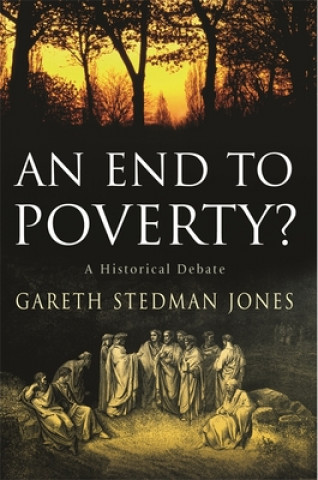
Kod: 11361508
An End to Poverty?: A Historical Debate
Autor Gareth Stedman Jones, Gareth Stedman Jones
In the 1790s, for the first time, reformers proposed bringing poverty to an end. Inspired by scientific progress, the promise of an international economy, and the revolutions in France and the United States, political thinkers suc ... więcej
- Język:
 Angielski
Angielski - Oprawa: Miękka
- Liczba stron: 288
Wydawca: Columbia Univ Pr, 2008
- Więcej informacji o książce

Zobacz książki o podobnej tematyce
-

Architecture in the South Pacific
285.03 zł -

Rookie Dad
77.72 zł -1 % -

Song for You and Me
76.71 zł -

Divine Three Manual
146.39 zł
Powiadomienie o dostępności
Wpisz swój adres e-mail, aby otrzymać od nas powiadomienie,
gdy książka będzie dostępna. Proste, prawda?
Więcej informacji o An End to Poverty?: A Historical Debate
 Opis
Opis
In the 1790s, for the first time, reformers proposed bringing poverty to an end. Inspired by scientific progress, the promise of an international economy, and the revolutions in France and the United States, political thinkers such as Thomas Paine and Antoine-Nicolas Condorcet argued that all citizens could be protected against the hazards of economic insecurity. In An End to Poverty? Gareth Stedman Jones revisits this founding moment in the history of social democracy and examines how it was derailed by conservative as well as leftist thinkers. By tracing the historical evolution of debates concerning poverty, Stedman Jones revives an important, but forgotten strain of progressive thought. He also demonstrates that current discussions about economic issues -- downsizing, globalization, and financial regulation -- were shaped by the ideological conflicts of the late eighteenth and early nineteenth centuries.Paine and Condorcet believed that republicanism combined with universal pensions, grants to support education, and other social programs could alleviate poverty. In tracing the inspiration for their beliefs, Stedman Jones locates an unlikely source-Adam Smith. Paine and Condorcet believed that Smith's vision of a dynamic commercial society laid the groundwork for creating economic security and a more equal society. But these early visions of social democracy were deemed too threatening to a Europe still reeling from the traumatic aftermath of the French Revolution and increasingly anxious about a changing global economy. Paine and Condorcet were demonized by Christian and conservative thinkers such as Burke and Malthus, who used Smith's ideas to support a harsher vision of society based on individualism and laissez-faire economics. Meanwhile, as the nineteenth century wore on, thinkers on the left developed more firmly anticapitalist views and criticized Paine and Condorcet for being too "bourgeois" in their thinking. Stedman Jones however, argues that contemporary social democracy should take up the mantle of these earlier thinkers, and he suggests that the elimination of poverty need not be a utopian dream but may once again be profitably made the subject of practical, political, and social-policy debates.
 Szczegóły książki
Szczegóły książki
- Pełny tytuł: An End to Poverty?: A Historical Debate
- Autor: Gareth Stedman Jones, Gareth Stedman Jones
- Język:
 Angielski
Angielski - Oprawa: Miękka
- Liczba stron: 288
- EAN: 9780231137836
- ISBN: 0231137834
- ID: 11361508
- Wydawca: Columbia Univ Pr
- Waga: 272 g
- Wymiary: 192 × 124 × 17 mm
- Data wydania: February 2008
Ulubione w innej kategorii
-

Dune
34.83 zł -33 % -

Haunting Adeline
125.75 zł -1 % -

Berserk Deluxe Volume 2
212.54 zł -1 % -

White Nights
15.29 zł -23 % -

Powerless
48.72 zł -11 % -

Atomic Habits
59.19 zł -26 % -

Dune Messiah
46.31 zł -3 % -

Berserk Deluxe Volume 3
218.08 zł -3 % -

One Day
32.61 zł -36 % -

Berserk Deluxe Volume 1
211.73 zł -2 % -

Iron Flame
61.11 zł -28 % -

Surrounded by Idiots
36.74 zł -28 % -

Harry Potter and the Prisoner of Azkaban (Minalima Edition)
170.35 zł -2 % -

Gravity Falls Journal 3
89.40 zł -

Heaven Official's Blessing: Tian Guan Ci Fu (Novel) Vol. 1
88.90 zł -1 % -

The Creative Act
100.17 zł -15 % -

Dune
47.31 zł -23 % -

Hunting Adeline
126.45 zł -4 % -

A Little Life
47.01 zł -14 % -

Children of Dune
46.71 zł -2 % -

Heaven Official's Blessing: Tian Guan Ci Fu (Novel) Vol. 2
77.72 zł -14 % -

Bungo Stray Dogs, Vol. 8 (light novel)
65.74 zł -4 % -

Percy Jackson and the Olympians 5 Book Paperback Boxed Set
185.45 zł -4 % -

Solo Leveling, Vol. 1
86.68 zł -3 % -

The Prisoner's Throne
44.90 zł -12 % -

Court of Thorns and Roses
43.39 zł -15 % -

Cry Baby Coloring Book
47.31 zł -1 % -

Fourth Wing
73.89 zł -12 % -

Icebreaker
35.13 zł -26 % -

Berserk Deluxe Volume 6
218.08 zł -3 % -

Avatar, the Last Airbender: The Kyoshi Novels (Box Set)
169.14 zł -2 % -

The 48 Laws of Power
100.88 zł -12 % -

House of Leaves
124.04 zł -3 % -

Twisted Lies
37.75 zł -26 % -

Dune Messiah
49.63 zł -13 % -

No Longer Human
58.49 zł -5 % -

48 Laws Of Power
61.11 zł -28 % -

Twisted Games
37.75 zł -26 % -

Caraval Paperback Boxed Set
175.49 zł -3 % -

Solo Leveling, Vol. 2
80.34 zł -17 % -

Open Circuits
169.55 zł -2 % -

Berserk Deluxe Volume 5
156.46 zł -30 % -

Heaven Official's Blessing: Tian Guan Ci Fu (Novel) Vol. 3
77.22 zł -14 % -

Berserk Deluxe Volume 4
201.26 zł -11 % -

Court of Mist and Fury
36.54 zł -26 % -

SOLO LEVELING V08
88.39 zł -2 % -

English File Upper Intermediate Multipack A (4th)
100.57 zł -

CHAINSAW MAN V14
42.68 zł -23 % -

Before the Coffee Gets Cold
33.92 zł -26 %
zadowolonych klientów
Od roku 2008 obsłużyliśmy wielu miłośników książek, ale dla nas każdy był tym wyjątkowym.
Copyright! ©2008-24 libristo.pl Wszelkie prawa zastrzeżonePrywatnieCookies



 21 milionów książek
21 milionów książek Dostawa 10.99 zł
Dostawa 10.99 zł (32) 444 93 66 (8-15.30h)
(32) 444 93 66 (8-15.30h)